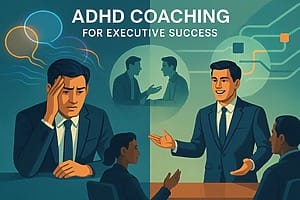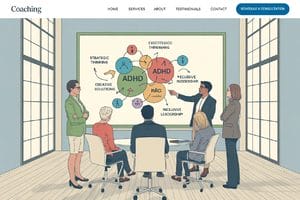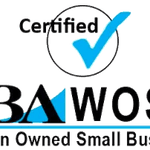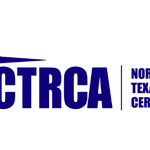TL;DR; ADHD traits can become leadership advantages with the right coaching approach. This article provides senior executives with concrete strategies to transform potential challenges like impulsivity and distractibility into strengths such as innovation and quick decision-making, while building sustainable systems for delegation, communication, and strategic focus.
The Executive ADHD Paradox
As a Master Certified Coach who lives with ADHD, I’ve observed a fascinating pattern among the senior executives I work with: the very traits that can create leadership challenges often fuel their greatest successes. One CEO I coached recently put it perfectly: “My mind moves at lightning speed – sometimes that means I’m three steps ahead of my team, and sometimes it means I’m three projects behind on deliverables.”
This paradox sits at the heart of leadership with ADHD. The same rapid-fire thinking that generates innovative solutions can lead to communication gaps with your team. The hyperfocus that allows you to solve complex problems might make it difficult to delegate effectively. The creative energy that inspires others can sometimes manifest as impulsive decision-making.
In our comprehensive guide to ADHD coaching for professionals, we explored the broad impact of ADHD in professional settings. Here, we’ll dive deeper into the specific challenges and opportunities for those in senior leadership positions – and how executive coaching can transform potential limitations into strategic advantages.
The Unique Challenges of Executive Leadership with ADHD
Leadership positions amplify both the strengths and challenges of ADHD. Through my work with C-suite executives and senior leaders at Tandem Coaching, I’ve identified several key areas where ADHD intersects with leadership responsibilities:
Strategic Vision vs. Operational Execution
Many executives with ADHD excel at big-picture thinking and strategic vision. They can see possibilities and connections that others miss, giving them an edge in innovation and market disruption. However, translating that vision into consistent execution often proves challenging.
One technology executive I worked with described it as “living in two different worlds.” In strategic planning sessions, his mind generated brilliant insights about market direction and product development. Yet when it came to implementing those ideas through systematic project management, he struggled to maintain focus and follow-through.
Through our coaching partnership, we developed what he called his “vision-to-action bridge” – a personalized system that connected his strategic thinking to operational execution. Rather than forcing himself to become someone he wasn’t, he learned to leverage his visionary thinking while building support structures for implementation.
Delegation and Team Development
Delegation presents a particular challenge for many ADHD leaders. The combination of perfectionism (often developed as a compensatory strategy) and difficulty tracking multiple moving pieces can make letting go of tasks especially difficult.
A financial services director I coached recognized this pattern in herself. “I know I should delegate more,” she told me, “but I’m afraid I’ll forget to follow up, or the work won’t meet my standards.” This fear led her to take on too much, creating bottlenecks in her department and limiting her team’s growth.
Together, we developed a delegation framework that worked with her ADHD brain rather than against it. This included visual tracking systems, structured check-in points, and clear success criteria that reduced the cognitive load of delegation while building her team’s capabilities.
Executive Presence and Communication
Communication challenges can significantly impact leadership effectiveness. For executives with ADHD, these might include:
- Difficulty organizing thoughts in high-pressure situations
- Tendency to interrupt or speak too quickly when excited
- Challenges maintaining focus during lengthy meetings
- Inconsistent follow-through on commitments
A marketing executive I worked with struggled with what she called “meeting amnesia” – leaving conversations with great intentions but quickly losing track of commitments as new priorities emerged. This pattern was affecting her credibility with peers and direct reports.
Through our coaching work, she developed communication protocols that supported her executive presence while accommodating her ADHD traits. These included structured note-taking systems, immediate action-item capture, and strategic meeting preparation techniques.
What Type of ADHD Leader Are You?
Your ADHD wiring creates a distinct leadership signature. Discover your primary pattern – Visionary, Crisis Champion, Connector, or Pattern-Spotter – and get personalized insights for leveraging your natural advantages.
Transforming ADHD Traits into Leadership Strengths
The most powerful shift happens when leaders stop viewing their ADHD traits as limitations to overcome and start recognizing them as potential advantages to leverage. This perspective change doesn’t happen overnight – it develops through intentional practice and coaching support.
From Distractibility to Innovation
What appears as distractibility in some contexts can manifest as exceptional pattern recognition and innovative thinking in others. Research suggests that the ADHD brain’s tendency to make unexpected connections contributes to creative problem-solving and innovation – crucial skills for senior leaders.
One CEO I worked with initially struggled with staying focused during strategic planning sessions. However, when we reframed these sessions to harness his natural thinking style, something remarkable happened. Instead of fighting against his tendency to make unexpected connections, we created a structure that captured these insights while maintaining progress toward objectives.
“I used to think my mind wandering was a weakness,” he shared. “Now I understand it’s how I spot opportunities others miss.”
From Impulsivity to Decisive Action
Impulsivity – often considered a challenge of ADHD – can become decisive action when properly channeled. In fast-moving industries where analysis paralysis poses a real threat, the ability to make quick decisions can provide a competitive edge.
A technology executive I coached learned to distinguish between situations requiring careful deliberation and those benefiting from rapid decision-making. We developed a simple framework that helped her identify when her natural inclination toward quick action was an asset rather than a liability.
“I used to second-guess my instincts,” she told me. “Now I understand when to trust my rapid assessment and when to slow down for deeper analysis.”
From Hyperfocus to Strategic Immersion
The ability to hyperfocus – to become completely absorbed in tasks that capture your interest – can be a remarkable leadership asset when directed toward strategic priorities. Many executives I’ve coached have learned to create conditions that trigger this state for their most important work.
One financial services leader discovered that his hyperfocus emerged most powerfully during creative problem-solving. We designed his schedule to protect uninterrupted blocks for this type of work, while building support systems for more routine tasks that didn’t naturally engage his attention.
Executive Coaching Strategies for ADHD Leaders
At Tandem’s ADHD Leadership Coaching program, we’ve developed specific approaches that help senior executives transform potential challenges into leadership advantages. These strategies are grounded in both neuroscience and practical leadership development.
Building Your Leadership Support System
Effective ADHD leadership isn’t about doing everything yourself – it’s about creating systems that complement your strengths while addressing potential blind spots. This might include:
Developing a strategic relationship with an executive assistant who excels at details and follow-through. One CEO I worked with transformed his effectiveness by partnering with an EA who managed his calendar and communications in ways that aligned with his thinking style.
Creating a leadership team with complementary strengths. A technology executive deliberately built a team that included detail-oriented operational leaders to balance her visionary thinking.
Implementing technology solutions that reduce cognitive load. Several clients have found that the right digital tools can externalize memory demands and create helpful structure without feeling constraining.
Enhancing Executive Communication
Clear, consistent communication becomes even more crucial for leaders with ADHD. Through coaching, executives develop personalized strategies for:
Preparing for high-stakes conversations. One client created what she called her “communication framework” – a simple structure that helped her organize thoughts before important meetings without scripting every word.
Managing attention during lengthy discussions. Another leader developed subtle techniques for maintaining engagement during board meetings, including strategic note-taking and brief mindfulness practices.
Following through on commitments. Several executives have implemented what we call “commitment tracking systems” – personalized approaches to ensuring that promises made become promises kept.
Strategic Energy Management
Perhaps the most transformative area of coaching for many ADHD executives involves learning to manage energy rather than just time. This includes:
Identifying your natural energy patterns and aligning your most demanding work accordingly. One CFO discovered that his strategic thinking was sharpest in the morning, while his people skills peaked in the afternoon. Restructuring his schedule around these patterns dramatically improved his effectiveness.
Creating boundaries that protect your focus and recovery. Several clients have implemented what we call “strategic unavailability” – designated periods where they’re inaccessible for non-emergency matters.
Developing sustainable practices that prevent burnout. Many high-achieving executives with ADHD push themselves to exhaustion. Through coaching, they learn to recognize early warning signs and implement recovery practices.
Optimize Your Leadership Energy
Great leadership requires knowing when you’re at your best. Discover your peak performance windows, focus triggers, and recovery patterns with our free Energy-Focus Profile.
Executive Scenario: Transforming Leadership Effectiveness
Consider this scenario based on a composite of executives I’ve coached:
The Challenge: Michael, a Chief Technology Officer with undiagnosed ADHD, was known for his brilliant technical vision but struggled with consistent execution. His team respected his expertise but found it difficult to follow his rapidly changing priorities. Board members questioned his ability to deliver on strategic initiatives, despite recognizing his innovative thinking. Michael worked 70+ hours weekly yet felt perpetually behind, leading to increasing stress and self-doubt.
The Coaching Approach: Through our work together, Michael:
- Gained clarity about how his ADHD traits influenced his leadership style
- Developed a strategic planning system that captured his innovative thinking while creating implementation structure
- Built a complementary leadership team that balanced his visionary approach
- Implemented communication protocols that translated his ideas into actionable direction
- Created boundaries that protected his energy and focus
The Outcome: Within six months, Michael’s team completed a major product launch on time and under budget. Board feedback shifted from concern to confidence. Most importantly, Michael reduced his working hours to 50 per week while increasing his strategic impact. “For the first time,” he shared, “I feel like I’m leading from my strengths rather than constantly compensating for perceived weaknesses.”
Leadership Skills Checklist for ADHD Executives
As you consider your own leadership journey, reflect on these key areas:
Strategic Vision and Execution
- Do I have a system for capturing innovative ideas and translating them into action plans?
- Have I created structures that support consistent implementation of strategic initiatives?
- Do I regularly review progress against objectives, adjusting course as needed?
Team Leadership and Delegation
- Have I built a team with complementary strengths that balance my leadership style?
- Do I have clear delegation protocols that ensure appropriate oversight without micromanagement?
- Am I developing my team members’ capabilities through effective coaching and feedback?
Executive Communication
- Do I prepare effectively for important conversations and presentations?
- Have I developed strategies for staying present and engaged during meetings?
- Do I have systems to ensure consistent follow-through on commitments?
Personal Effectiveness
- Am I managing my energy in ways that sustain high performance?
- Have I created boundaries that protect my focus and recovery?
- Do I leverage my natural strengths while addressing potential blind spots?
The Path Forward: Executive Coaching for ADHD Leaders
According to Forbes Coaches Council, executives with ADHD benefit significantly from learning to perceive social cues and form better habits through coaching. This aligns with what I’ve observed in my practice – the right coaching partnership can transform potential limitations into leadership advantages.
Research supports this approach. Studies indicate that coaching leads to significant improvements in executive functioning and goal attainment within about 3-6 months of consistent engagement. For leaders with ADHD, these improvements translate directly to enhanced leadership effectiveness.
What makes this transformation possible isn’t forcing yourself to conform to neurotypical expectations. Rather, it’s developing a leadership approach that authentically leverages your unique thinking style while building support for areas that don’t come naturally.
As one executive client put it: “I spent years trying to fix what I thought was broken. Through coaching, I discovered that my different way of thinking isn’t a liability – it’s my greatest asset as a leader.”
Frequently Asked Questions
Can someone with ADHD really be an effective leader?
Absolutely. Many exceptional leaders have ADHD or ADHD traits. The key is developing systems and approaches that leverage strengths while addressing challenges. In fact, many ADHD traits – creativity, resilience, and out-of-the-box thinking – are highly valuable in leadership roles. With the right support, leaders with ADHD often excel at innovation, crisis management, and inspiring teams through authentic connection.
How does ADHD coaching improve delegation and communication for an executive?
ADHD coaching provides personalized strategies that work with your natural thinking style. For delegation, this might include visual tracking systems, clear decision criteria for what to delegate, and structured check-in protocols. For communication, coaching helps develop frameworks that organize thoughts without feeling constraining, techniques for staying present in conversations, and systems for consistent follow-through. Unlike generic leadership advice, ADHD coaching addresses the specific executive function challenges that impact these leadership skills.
I'm worried that discussing my ADHD will make me seem "less capable" as a leader. Will coaching keep this private?
Absolutely. Professional coaching relationships are strictly confidential. Many executives choose to work with coaches outside their organization specifically to create a safe space for exploring challenges and developing strategies. You control if, when, and how to disclose your ADHD to others. What’s more, seeking coaching demonstrates self-awareness and commitment to growth – qualities of exceptional leaders. At Tandem Coaching, we understand the sensitivity around neurodiversity in leadership positions and maintain the highest standards of confidentiality.
Elevate Your Leadership Potential
If you recognize your experience in what I’ve described, you’re not alone. Many successful executives navigate similar challenges – often silently and at great personal cost. The question isn’t whether you can succeed with ADHD; many leaders already do. The question is whether you want to transform the constant struggle into sustainable success.
Through our ADHD Executive Coaching program, we partner with senior leaders to develop personalized strategies that leverage their unique thinking styles while building support for potential challenges. Our approach combines deep understanding of ADHD with extensive leadership development expertise.
Ready to transform your leadership journey? Schedule a complimentary discovery session to explore how ADHD-informed executive coaching can enhance your leadership effectiveness. During this confidential conversation, we’ll discuss your specific challenges and opportunities, and determine if our approach aligns with your needs.
Discover Your ADHD Leadership Profile
Every ADHD executive leads differently. Take our free 5-minute assessment to uncover whether you’re an Innovative Visionary, Crisis Champion, Empathetic Connector, or Strategic Pattern-Spotter – and learn how to leverage your unique strengths.
Want a Thought Partner?
You’ve read the strategies. You understand the concepts. But sometimes what you need isn’t another framework – it’s a conversation with someone who’s coached ADHD executives through exactly what you’re facing.
Cherie offers complimentary 30-minute consultations for ADHD leaders ready to stop managing around their brain and start leveraging it. No pitch. No obligation. Just a focused conversation about your situation.
About the Authors
Cherie Silas, MCC
She has over 20 years of experience as a corporate leader and uses that background to partner with business executives and their leadership teams to identify and solve their most challenging people, process, and business problems in measurable ways.















